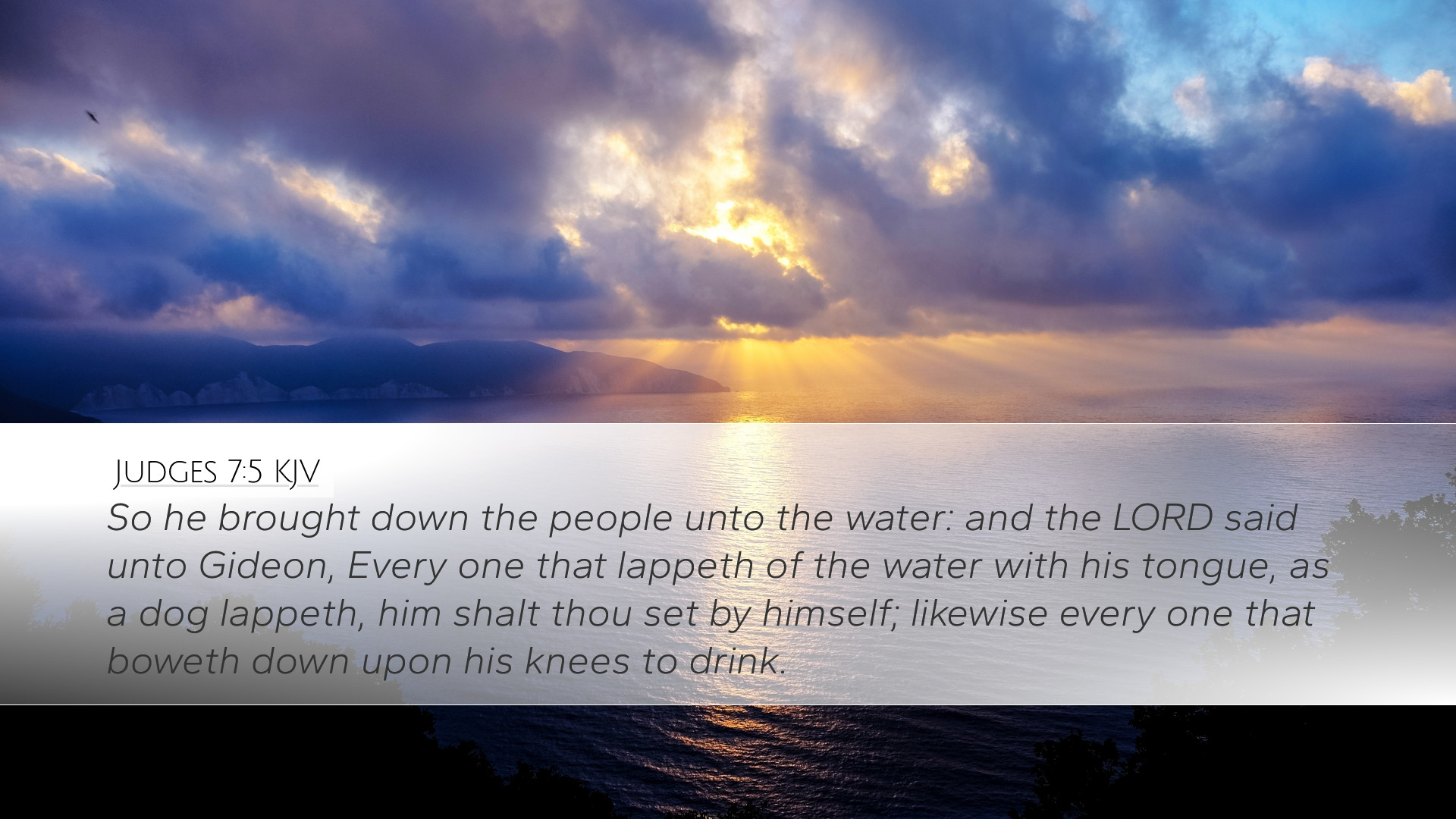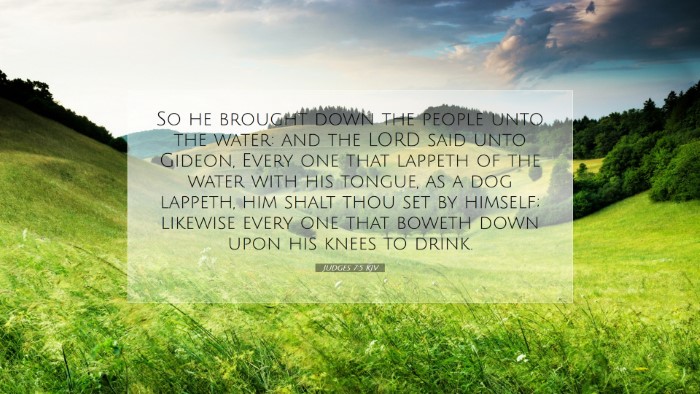Old Testament
Genesis Exodus Leviticus Numbers Deuteronomy Joshua Judges Ruth 1 Samuel 2 Samuel 1 Kings 2 Kings 1 Chronicles 2 Chronicles Ezra Nehemiah Esther Job Psalms Proverbs Ecclesiastes Song of Solomon Isaiah Jeremiah Lamentations Ezekiel Daniel Hosea Joel Amos Obadiah Jonah Micah Nahum Habakkuk Zephaniah Haggai Zechariah MalachiJudges 7:5
Judges 7:5 KJV
So he brought down the people unto the water: and the LORD said unto Gideon, Every one that lappeth of the water with his tongue, as a dog lappeth, him shalt thou set by himself; likewise every one that boweth down upon his knees to drink.
Judges 7:5 Bible Commentary
Commentary on Judges 7:5
Judges 7:5 states, "So he brought down the people unto the water: and the Lord said unto Gideon, Every one that laps of the water with his tongue, as a dog lappeth, him shalt thou set by himself: likewise every one that boweth down upon his knees to drink." This passage is a significant event in the narrative of Gideon's campaign against the Midianites, where the method of selecting soldiers is divinely orchestrated.
Contextual Background
Before diving into the specific analysis of Judges 7:5, it is essential to understand the broader context of the Book of Judges. This book illustrates a cyclical pattern of Israel's disobedience, oppression by enemies, repentance, and divine deliverance. Gideon is introduced as a judge called by God to liberate Israel from Midianite oppression. His story highlights themes of faith, divine selection, and God's sovereignty in human affairs.
Selecting the Soldiers
In this verse, God instructs Gideon to bring the people to the water to determine which of them is fit for battle. This method appears peculiar but is rich in theological significance and practical implications.
- The Testing Method: The act of lapping water from the ground like a dog might seem whimsical, yet it serves as a divine filter. Commentary insights suggest that this method was not arbitrary; it was designed to reveal the vigilance and readiness of the warriors. Those who lapped were presumably more alert to their surroundings, indicative of qualities necessary for military engagement.
- Symbol of Divine Selection: Albert Barnes notes the symbolism in this selection process. God chooses not based on conventional understandings of readiness. Instead, He emphasizes the importance of divine criteria in determining who is suited to fulfill His purposes.
- Faith in Action: This passage illustrates Gideon's growing faith. Initially reluctant, Gideon now obeys God's command, demonstrating a transformation from doubt to action, a recurring theme in the biblical narrative. Adam Clarke emphasizes that this action signifies Gideon's acceptance of God’s chosen methods despite their apparent irrationality.
Theological Reflections
The selection of soldiers can be seen as a microcosm of God's broader redemptive plans throughout Scripture. The faithfulness of a few can lead to divine victories. Theologically, this raises important questions about how God equips His people for service and how He measures readiness.
- God’s Sovereignty: As revealed in this passage, God is sovereign over the affairs of men. Matthew Henry interprets the lapping process as God’s sovereign prerogative to choose whom He wills for His purposes. It emphasizes the truth that God can accomplish His purposes through the most unlikely means.
- Lessons on Discernment: The criteria set by God for selecting soldiers teaches modern believers the importance of discernment. In any ministry or mission, evaluating individuals for their readiness and suitability according to divine standards is vital.
- Physical vs. Spiritual Preparedness: The selection emphasizes that readiness is more than just physical prowess. It involves a spiritual alertness to God’s voice and the ability to respond to His commands swiftly. This serves as a reminder for believers today to cultivate both personal holiness and readiness to engage in God’s mission.
Pastoral Applications
For pastors and those in ministry, Judges 7:5 presents several applications:
- Leading by Prayer: Like Gideon, leaders must be attuned to God’s guidance in decision-making, especially in selecting those who will partner in ministry. Prayer is essential for discernment.
- Valuing Character over Numbers: The narrative warns against relying solely on numbers in ministry. It serves to remind leaders that God often works through a remnant, and powerful outcomes can arise from a small, cohesive, and faithful group.
- Encouragement to the Overlooked: Just as God chose a seemingly inferior group to achieve victory, pastors should encourage those they deem unqualified, reinforcing God’s power to use anyone willing to follow Him.
Conclusion
Judges 7:5 encapsulates profound truths about God's methods of preparation and selection for His plans. By examining Gideon’s experience, we find timeless principles relevant for personal growth and collective engagement in God's mission. May this serve as an encouragement for pastors, students, and scholars to seek discernment from God, to rely on His wisdom, and to recognize His sovereignty in all circumstances.


